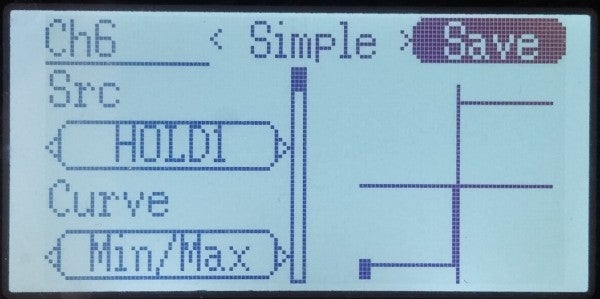Table of contents
- Before you start
- Beginner's Guide
- Downloads
- Configuration
- Compatibility
- Telemetry
- WHOOP Section
- Troubleshooting
- SilverHardware
- Go Brushless
- Tuning a quad
- Quadcopter mods
- Merchandise
- Links
H8 mini (Bayang protocol) radio channel mapping:
Ch 1 - Roll
Ch 2 - Pitch
Ch 3 - Throttle
Ch 4 - Yaw
Ch 6 - Flip
Ch 9 - Headless
Ch 10 - RTH
One method to set up a switch on a Devo (or multipro module) to switch between acro and level modes:
1. Set up a switch on the Devo on Ch 9 so it switches between -100 and +100 (-100 is acro, +100 is level)
2. In config.h of the firmware, set the acro/level mode switch to “CH_HEADFREE”. Note “headless” and “headfree” mean the same thing in this firmware.
Change the default level/acro switch in config.h from this:
#define LEVELMODE CH_AUX1
to this:
#define LEVELMODE CH_HEADFREE
For a Devo or other tx using a Goebish multiprotocol module, it is sufficient to set the scale for each stick (or switch) to + and - 100%.
If you want to do an accel calibration, or use gestures to switch from level to acro mode, make sure your rates are at least 85%, or the stick movements will not register with the FC. Also, you need to be in level mode for an accel cal to work.
If you want to keep the headless function, then choose CH 6 or CH 10 for the level/acro switch and set the level/acro switch in config.h to suit (CH_FLIP or CH_RTH respectively).
In config.h, the default “#define LEVELMODE CH_AUX1” is used if you have a stock tx and want to use the gestures mode to switch between the acro and level modes. The gestures switch a virtual channel within the firmware named “AUX 1” on and off. A “gesture” consists of a stick sequence, left/left/down on the pitch/roll stick within 2 seconds, and then the LED's flash in recognition, and right/right/down to switch back. Gestures can be used with a Devo or other tx with a Goebish multiprotocol module, in lieu of a programmed switch.
Here is a pic of a Devo screen showing a level/acro switch set up on Ch 6 (thanks to czajunia on rcgroups). The HOLD1 switch has been selected as the source in the Devo, and the curve is set to min/max, so the radio output is -100 or +100 depending on the position of the HOLD1 toggle switch. For Devo Ch 6, you would set the level/acro switch in the firmware in config.h to CH_FLIP.

Rates:
For Devo or a multipro module, high rates is selected in config.h in the firmware, and then the low rate is set in your tx, to whatever value or values you prefer. See below for an alternate method
// rates / expert mode #define RATES CH_EXPERT
The actual rate of the “high” or “expert” rates is selected here, in this case (the default values are shown), we have 180 x 2 = 360 degrees per second for the high rate. The firmware will accept up to 2000 degrees per second I believe, if you want faster rates, you can increase either the 180.0f value or the multiplier 2.0f.
// rate in deg/sec // for low rates ( acro mode) #define MAX_RATE 180.0f #define MAX_RATEYAW 180.0f // multiplier for high rates // devo/module uses high rates only #define HIRATEMULTI 2.0f #define HIRATEMULTIYAW 2.0f
There is an alternate method to set rates on the quad using a radio channel, any of CH5 to CH10, In the code above, there is a low rate setting and a multiplier for high rates. The high rate can be selected with a radio channel in config.h as shown in the code below, the example uses CH5 to activate high rates. Thus by adjusting the values for MAX_RATE and HIRATEMULTI the low and high rates can be set to your preference. MAX_RATEYAW and HIRATEMULTIYAW work on the yaw axis only. STM Silverware (H8 blue, CG023, BWHOOP) does it the opposite way: You set the max rates in config.h and use a multi smaller than 1 to turn them down while low rates are selected.
// rates / expert mode #define RATES DEVO_CHAN_5